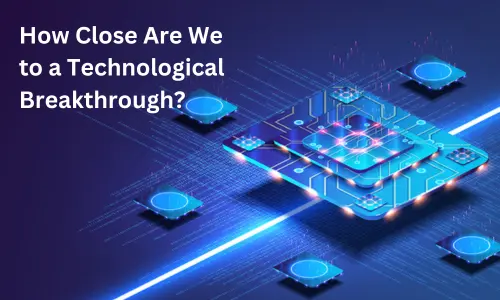Quantum Computing: How Close Are We to a Technological Breakthrough?
Quantum computing, often heralded as the next revolution in technology, has the potential to transform industries by solving complex problems that are beyond the reach of classical computers. From cryptography to drug discovery and artificial intelligence, quantum computers could unlock possibilities previously considered impossible. However, despite the enormous potential of this cutting-edge technology, the question remains: how close are we to a technological breakthrough in quantum computing?
In this article, we’ll explore the current state of quantum computing, the challenges it faces, and the milestones that suggest we may be on the verge of a transformative breakthrough.
1. What is Quantum Computing?
1.1 Quantum Mechanics Meets Computing
Quantum computing leverages the principles of quantum mechanics, a branch of physics that deals with the behavior of particles at the smallest scales—atoms and subatomic particles. Quantum computing, however, uses quantum bits or “qubits,” which can exist in multiple states at once due to a property called superposition. This allows quantum computers to process exponentially more information than classical computers.
1.2 Key Concepts: Superposition and Entanglement
Two fundamental principles that underpin quantum computing are superposition and entanglement. Superposition allows qubits to be in a combination of 0 and 1 states simultaneously, rather than being constrained to one or the other.
Entanglement is another key quantum phenomenon, where the state of one qubit is directly linked to the state of another, no matter how far apart they are. This interconnectedness allows quantum computers to perform computations faster than classical systems by leveraging the relationships between qubits.
2. Current State of Quantum Computing
2.1 Progress in Quantum Hardware
Over the past decade, significant progress has been made in building quantum hardware, though challenges remain. Companies like IBM, Google, and Rigetti, as well as research institutions, have developed quantum processors with increasing numbers of qubits. However, the performance of these processors is still limited by issues such as quantum decoherence (loss of information due to environmental noise) and error rates.
- IBM’s Quantum Roadmap: IBM is one of the leading companies in quantum computing, with a clear roadmap for achieving large-scale quantum systems. IBM’s latest quantum processors, such as Eagle and Osprey, feature 127 and 433 qubits respectively. The company aims to surpass 1,000 qubits with its Condor processor by 2025, bringing us closer to practical quantum applications.
- Google’s Quantum Supremacy Claim: In 2019, Google claimed to have achieved quantum supremacy, a milestone where a quantum computer outperforms the most powerful classical computers. Using their 53-qubit Sycamore processor, Google successfully solved a mathematical problem that would have taken classical supercomputers thousands of years. However, critics argue that the problem solved had limited practical relevance.
2.2 Quantum Algorithms and Software
While hardware development is critical, quantum computing’s true potential lies in the algorithms that will run on these machines. Quantum algorithms, such as Shor’s algorithm for factoring large numbers and Grover’s algorithm for searching unsorted databases, demonstrate the power of quantum computers to solve problems exponentially faster than classical algorithms.
- Quantum Chemistry: Quantum computers hold promise for modeling complex molecules, which could revolutionize drug discovery and materials science. Traditional computers struggle to simulate the quantum behavior of large molecules, but quantum computers, which operate using the same principles, can do so efficiently. This could lead to breakthroughs in pharmaceuticals, agriculture, and clean energy.
- Quantum Cryptography: One of the most widely discussed applications of quantum computing is in cryptography. Quantum cryptography, however, also offers solutions, such as quantum key distribution (QKD), which is theoretically unhackable.
3. Challenges on the Road to a Quantum Breakthrough
3.1 Error Correction and Noise
One of the greatest challenges in quantum computing is error correction. Quantum systems are highly sensitive to environmental noise, and even slight interference can cause a qubit to lose its state—this is known as quantum decoherence. To perform accurate and reliable calculations, quantum computers need sophisticated error-correcting codes.
Current quantum computers operate in a regime known as NISQ (Noisy Intermediate-Scale Quantum), meaning they are still too error-prone for most practical applications. While researchers are making progress in developing error-correcting methods, we are still far from building fault-tolerant quantum systems that can perform complex computations without errors.
3.2 Scaling Up Qubits
Another major challenge is scaling quantum computers to thousands or millions of qubits. While companies like IBM and Google have developed quantum processors with over 100 qubits, building machines with thousands of qubits that can perform meaningful computations remains difficult. This is due to the delicate nature of qubits, which are prone to noise and require extreme conditions, such as near absolute-zero temperatures, to operate.
In addition to increasing the number of qubits, researchers must also find ways to improve the connectivity and coherence times of these qubits, ensuring they can work together effectively without losing information.
4. Potential Quantum Breakthroughs on the Horizon
4.1 Quantum Error Correction and Fault-Tolerant Systems
One of the most critical milestones for quantum computing is the development of fault-tolerant systems that can perform computations reliably, even in the presence of noise. Researchers are working on quantum error-correction codes that could protect quantum information and allow for more stable and accurate computations. The realization of fault-tolerant quantum systems is seen as a key step toward practical quantum applications.
4.2 Quantum Advantage in Specific Applications
While large-scale, general-purpose quantum computers may still be years away, we are likely to see quantum advantage in specific applications much sooner. Quantum advantage refers to the point where quantum computers can solve problems that classical computers cannot, but in real-world applications rather than abstract demonstrations of power.
Industries such as pharmaceuticals, finance, logistics, and materials science are actively exploring quantum computing for specific use cases, such as optimizing supply chains, developing new drugs, and improving financial modeling. These narrow, domain-specific applications could demonstrate the power of quantum computing within the next decade.
5. Quantum Computing and Cryptography: A Double-Edged Sword
5.1 Breaking Current Encryption Standards
Classical encryption methods, such as RSA and elliptic curve cryptography, rely on the fact that factoring large numbers or solving complex mathematical problems is computationally difficult for classical computers. However, quantum algorithms like Shor’s algorithm could make breaking these encryption methods trivial.
This poses a significant threat to cybersecurity, as much of today’s digital infrastructure relies on these cryptographic techniques. If a sufficiently powerful quantum computer is developed, it could potentially break current encryption standards, exposing sensitive data and communications.
5.2 Quantum-Safe Cryptography
To mitigate the risks posed by quantum computers, researchers are developing quantum-resistant cryptographic algorithms. These algorithms are designed to be secure against both classical and quantum attacks, ensuring that future communications remain safe even in the presence of powerful quantum computers.
In addition, quantum cryptography offers new methods for secure communication, such as quantum key distribution (QKD), which uses the principles of quantum mechanics to create encryption keys that cannot be intercepted or tampered with.
6. The Future of Quantum Computing: How Close Are We?
6.1 Milestones to Watch For
While significant progress has been made in quantum computing over the past decade, we are still in the early stages of development. Several key milestones will signal that we are moving closer to a technological breakthrough:
- Fault-Tolerant Quantum Computers: The development of error-correcting codes and fault-tolerant quantum systems will be a major step toward realizing practical quantum computers.
- Quantum Supremacy in Real-World Applications: Demonstrating quantum supremacy in real-world use cases, such as drug discovery or materials science, will show that quantum computers can outperform classical computers in meaningful ways.
- Scaling to Thousands of Qubits: The ability to scale quantum computers to thousands or millions of qubits will be critical for solving complex problems that are currently beyond the reach of classical computers.
6.2 A Decade of Innovation Ahead
While we may still be years away from large-scale, general-purpose quantum computers, the pace of innovation in this field is accelerating. Governments, academic institutions, and tech giants are investing heavily in quantum research, and new breakthroughs are expected in the coming decade. Industries that stand to benefit from quantum computing are already preparing for the technology’s arrival, exploring potential use cases and building the infrastructure needed to support quantum applications.
Conclusion
Quantum computing has the potential to reshape industries and solve problems that were once thought insurmountable. While we are still in the early stages of development, the progress made so far suggests that we are on the cusp of a quantum breakthrough. As researchers continue to tackle challenges such as error correction, scalability, and practical applications, the dream of quantum computing is becoming a reality. Although it may take another decade or more before quantum computers are widely used, their impact on fields such as cryptography, healthcare, and artificial intelligence will be transformative.







